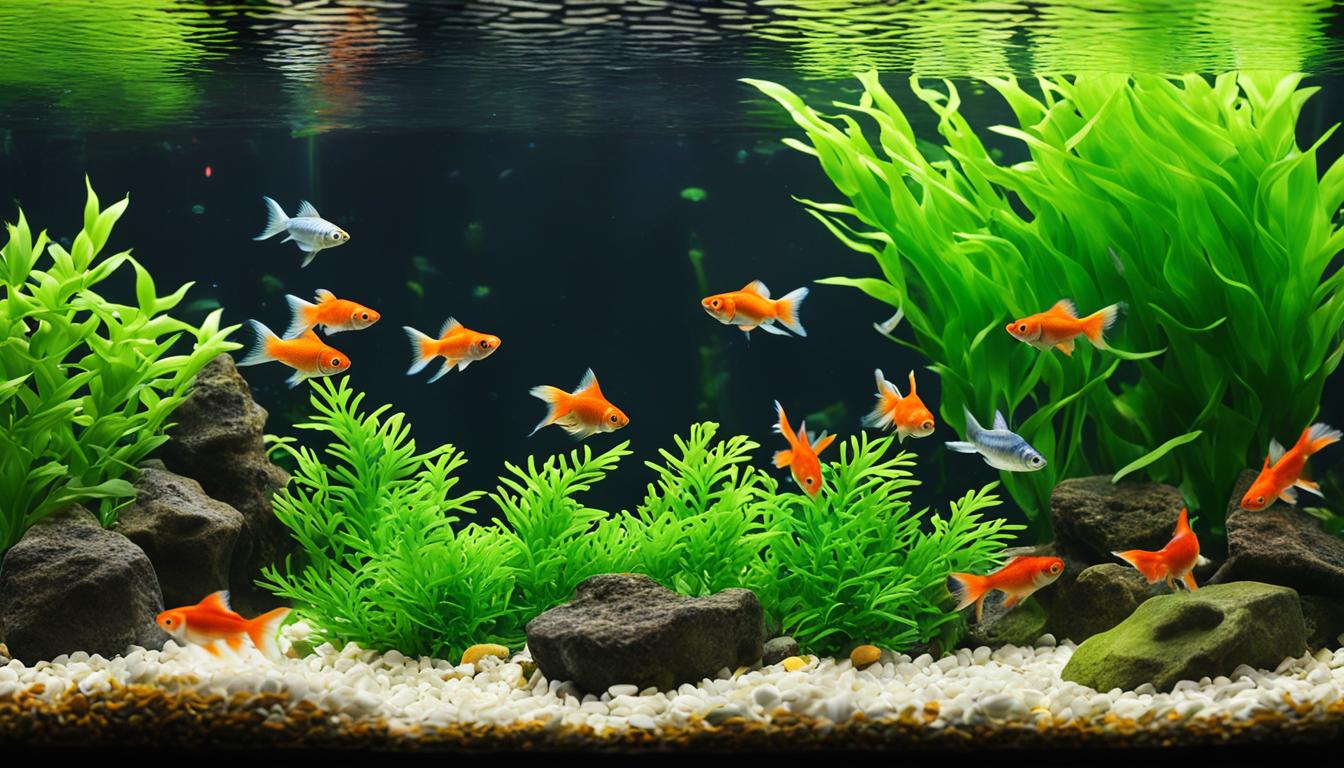Last Updated on 1 year by admin
Are you thinking about adding guppies and goldfish to your aquarium? While both species are popular among fish enthusiasts, it’s important to consider their compatibility and the best practices for housing them together.
Guppies and goldfish are both freshwater fish that share some similarities. They are both omnivores and have been selectively bred for certain characteristics. However, there are differences between the two, including their size, lifespan, and breeding habits.
While guppies and goldfish can tolerate similar temperature ranges, there are potential challenges in keeping them together. Goldfish are known to nip the fins of smaller fish, and there is a risk of goldfish eating smaller guppies. To ensure the well-being of both species, it is generally recommended to house guppies and goldfish separately.
When it comes to tank requirements, guppies prefer temperatures in the range of 72 to 82°F, while goldfish thrive in cooler temperatures between 68 and 74°F. Providing a compromise temperature around 70°F can help accommodate both species.
Key Takeaways:
- Guppies and goldfish have some similarities but also some important differences.
- Goldfish can be aggressive towards smaller fish and may eat guppy fry.
- It is generally recommended to house guppies and goldfish separately to meet their individual needs.
- Guppies prefer warmer temperatures, while goldfish thrive in cooler temperatures.
- Keeping guppies and goldfish together requires careful consideration and monitoring of their interactions.
Similarities Between Guppies and Goldfish
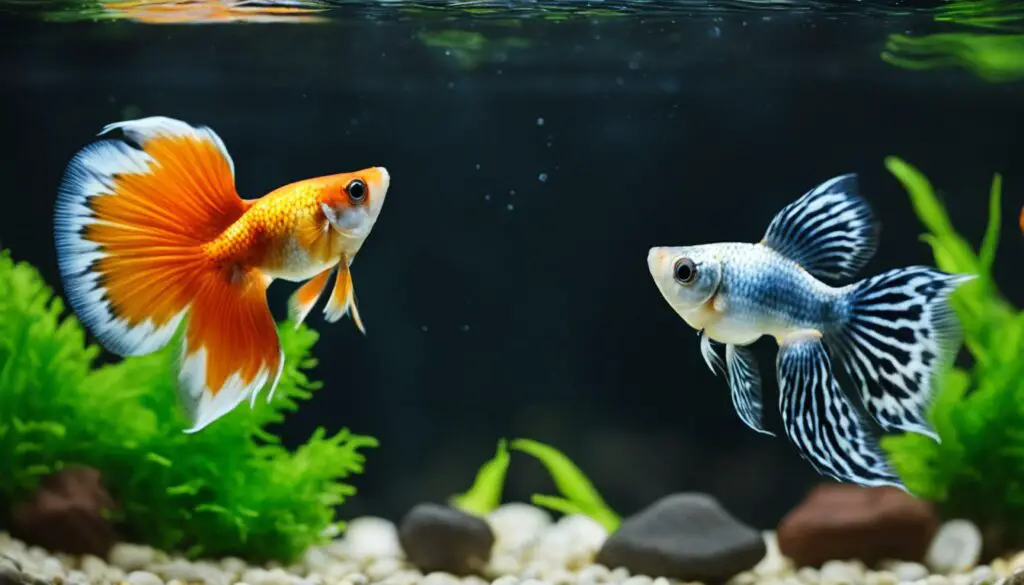
Guppies and goldfish are both types of freshwater fish and share several similarities in their characteristics and care requirements. Understanding these similarities is essential for creating a harmonious and thriving aquarium environment. Let’s explore the commonalities between these two fascinating fish:
1. Fish Type and Diet:
Both guppies and goldfish are omnivores, which means they have a diverse diet that includes both plant and animal-based foods. They can be fed similar diets, including flakes, pellets, brine shrimp, bloodworms, and vegetables. Providing a balanced and nutritionally rich diet is vital to ensure the health and vitality of both species.
2. Selective Breeding:
Guppies and goldfish have been selectively bred over generations to display distinct colors, patterns, and tail shapes. This selective breeding has resulted in a wide range of mesmerizing variations within each species. Whether you’re captivated by guppies’ vibrant colors or goldfish’s elegant fins, the art of selective breeding allows for endless possibilities in aquarium aesthetics.
Pro Tip: Both guppies and goldfish are available in various striking colorations and tail shapes. Adding a mix of different variations can create a visually stunning aquarium display.
As you can see, guppies and goldfish share significant similarities in their dietary needs and visual appeal. However, it is important to keep in mind that they are still distinct species with unique requirements and behaviors.
Differences Between Guppies and Goldfish
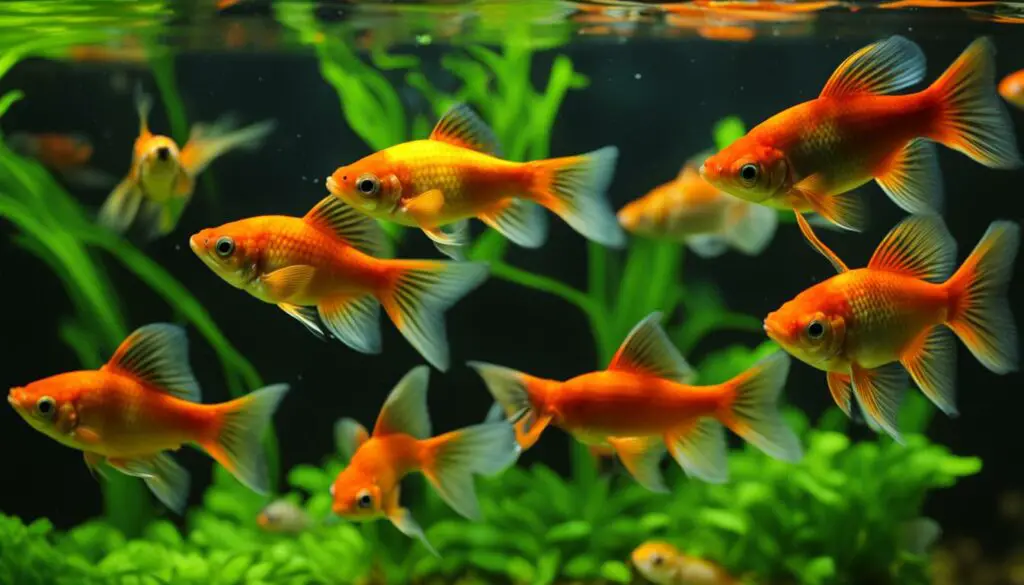
Guppies and goldfish are two distinct species with notable differences in size, lifespan, and breeding habits. Understanding these disparities is essential when considering cohabitation in an aquarium.
Size Difference
Guppies are considerably smaller than goldfish. They typically reach a maximum length of around 2 inches, while goldfish can grow up to 10 inches or even larger.
Lifespan
Goldfish have a longer lifespan compared to guppies. Goldfish can live for 10 years or more, while the average lifespan of guppies is around 5 years.
Breeding Habits
Guppies and goldfish also differ in their breeding habits. Guppies are livebearers, giving birth to live fry, while goldfish are egg layers.
These differences, from size to lifespan and breeding habits, contribute to the challenges of keeping guppies and goldfish together. It’s important to consider these factors when deciding to house them in the same tank.
| Guppies | Goldfish | |
|---|---|---|
| Size | Up to 2 inches | Up to 10 inches or larger |
| Lifespan | Around 5 years | 10 years or more |
| Breeding | Livebearers (live fry) | Egg layers |
Temperature Requirements for Guppies and Goldfish
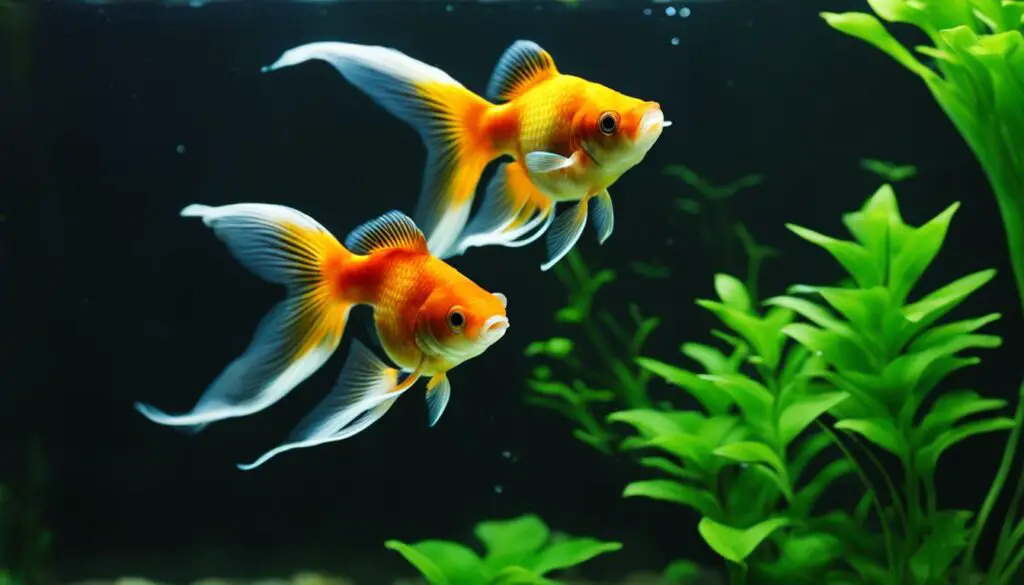
Guppies and goldfish have different temperature preferences, and it is crucial to provide them with suitable conditions to thrive in your aquarium. Understanding the temperature requirements for both species will ensure their optimal health and well-being.
Guppies:
Guppies are tropical fish that prefer warmer water temperatures. The ideal temperature range for guppies is between 72 and 82°F (22 and 28°C). Maintaining the water within this range will promote their activity, growth, and overall vitality.
Goldfish:
Goldfish, on the other hand, thrive in cooler water temperatures. They are coldwater fish and prefer temperatures between 68 and 74°F (20 and 23°C). Lower temperatures help goldfish maintain their metabolism and avoid certain health issues associated with warmer water.
While there is some overlap between their temperature ranges, finding a compromise that accommodates both goldfish and guppies is essential. A temperature around 70°F (21°C) can provide a suitable environment for both species, allowing them to coexist comfortably.
Providing a stable and consistent temperature in the tank is crucial. Fluctuating temperatures can stress and compromise the health of both goldfish and guppies. Use a reliable aquarium thermometer to monitor the temperature regularly and make adjustments if necessary.
Creating a comfortable environment with appropriate temperature conditions will contribute to the overall well-being and happiness of your guppies and goldfish.
Compatibility Between Guppies and Goldfish
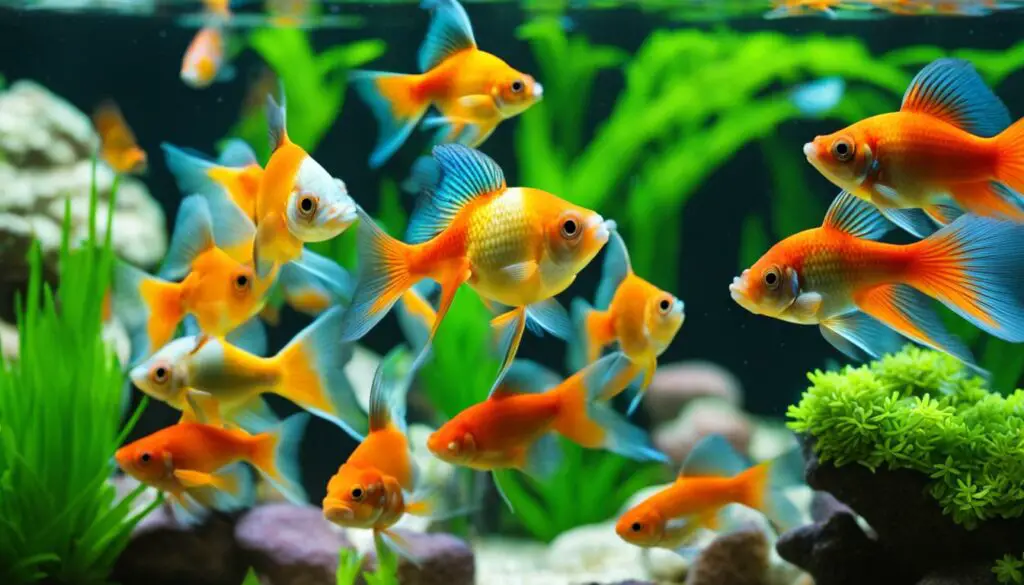
Guppies and goldfish are generally peaceful fish that can coexist with other peaceful species. However, there are potential challenges in keeping them together. Both guppies and goldfish are prone to fin nipping, which can lead to stress and injuries. Goldfish may also try to eat smaller guppies, posing a choking hazard and potential harm to both fish. While some individuals may successfully keep guppies and goldfish together, it is important to monitor their interactions and provide sufficient space and hiding places to reduce the risks.
It is crucial to ensure the compatibility of tank mates, specifically when managing guppies and goldfish in one aquarium. Here are some important points to consider:
- Social behavior: Guppies and goldfish are social fish but have different temperaments. Guppies are generally more active and agile, while goldfish tend to be slower. It is essential to monitor their interactions to prevent any aggressive behavior or fin nipping.
- Size: Goldfish can grow much larger than guppies. The size disparity between the two species can lead to potential conflicts, particularly if the goldfish mistake the guppies for food.
- Space: Providing ample space in the aquarium is crucial for both guppies and goldfish. A crowded tank can increase stress levels and intensify any potential conflicts between the two species.
- Hiding places: Creating hiding places, such as plants, rocks, or decorations, can help reduce stress and provide shelter for guppies. These hiding places can also help protect guppy fry from being preyed upon by goldfish.
“It is crucial to ensure the compatibility of tank mates, specifically when managing guppies and goldfish in one aquarium.”
While some aquarists have successfully housed guppies and goldfish together, it is important to weigh the potential risks and drawbacks. Monitoring the fish closely, providing suitable conditions, and being ready to separate the fish if necessary can help increase the chances of successful cohabitation. Ultimately, the well-being and safety of the fish should be the top priority when deciding whether to house guppies and goldfish together.
Considerations for Keeping Guppies and Goldfish Together
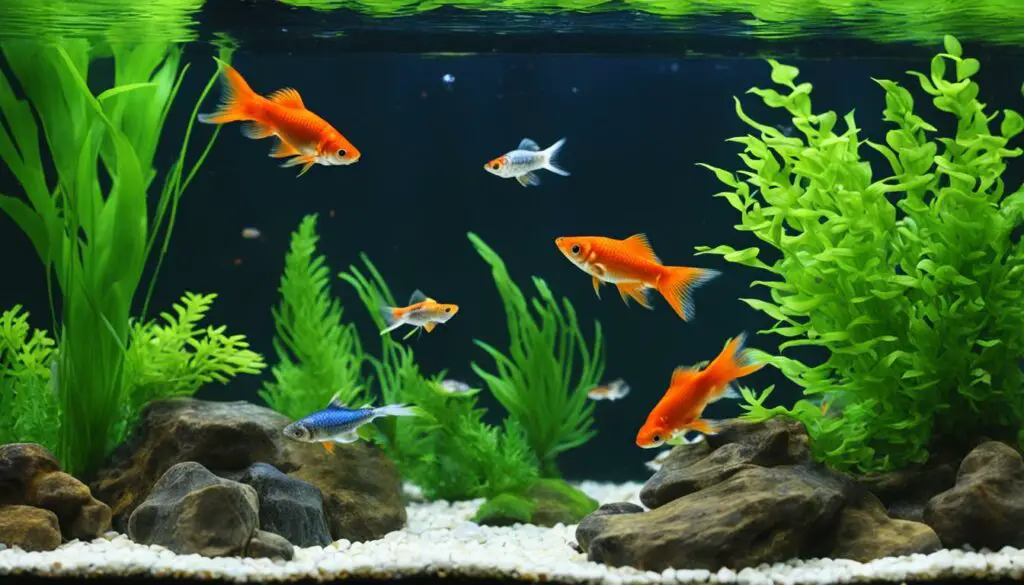
To increase the chances of successful cohabitation between guppies and goldfish, there are several important considerations to keep in mind. By following these best practices for housing guppies and goldfish, you can create a harmonious aquatic environment for both species.
Adequate Space
A larger aquarium provides more space for the goldfish and reduces the potential for conflicts. With ample swimming room, goldfish are less likely to exhibit territorial behaviors that could pose a threat to guppies. To ensure the comfort and well-being of both fish, it is recommended to provide a tank spacious enough to accommodate the size of the goldfish.
Proper Filtration and Tank Maintenance
Goldfish are known for their significant waste production, which can quickly deteriorate water quality if not properly managed. Good filtration and regular tank maintenance are essential to maintain a clean and healthy environment for both guppies and goldfish. By removing excess waste and maintaining optimal water conditions, you can minimize the risk of waterborne diseases and promote the well-being of your fish.
Maintain Stable Temperature
Both guppies and goldfish have specific temperature preferences. It is important to ensure a stable temperature in the tank to maintain their overall health and well-being. A temperature around 70°F provides a compromise that accommodates both goldfish and guppies, minimizing stress and enhancing their compatibility.
Neutral pH Level
A neutral pH level is ideal for creating a suitable environment for both guppies and goldfish. Regular monitoring of the pH level and making necessary adjustments will help ensure optimal conditions for their growth and longevity.
Hiding Places
Providing hiding places and plants in the aquarium is crucial when keeping guppies and goldfish together. These hiding places offer refuge for guppies, especially when they are carrying fry. They can help protect guppy fry from potential predation by goldfish, ensuring their survival.
By considering these vital aspects, you can create a suitable environment that promotes the compatibility and well-being of both guppies and goldfish in the same tank.
Choosing Compatible Goldfish for Guppies
When considering housing guppies and goldfish together, it is important to choose goldfish varieties that are compatible with guppies. By selecting the right species, you can minimize the risks of aggression and ensure a harmonious tank environment.
Here are some suitable goldfish varieties for coexistence with guppies:
| Goldfish Varieties | Description |
|---|---|
| 1. Comets | Comets are slim-bodied goldfish that are generally peaceful and less likely to eat adult guppies. |
| 2. Shubunkins | Shubunkins have a calmer temperament and can coexist with guppies, creating a dynamic and visually appealing tank. |
| 3. Slim-Bodied Fish | Other slim-bodied goldfish, such as common goldfish or sarasa comets, can be suitable tank mates for guppies. |
| 4. Veiltails | Veiltail goldfish have flowing tails that can impair their swimming abilities, reducing their likelihood of chasing or harming guppies. |
| 5. Black Moors | Black Moors are visually striking goldfish that are generally more docile, making them compatible with guppies. |
However, it is essential to closely monitor the interactions between goldfish and guppies. While these goldfish varieties have a lower risk of aggression, individual temperament can vary. If any conflicts or threats arise, be prepared to separate them to ensure the well-being of both species.
Expert Tip:
Introducing goldfish and guppies to each other’s presence gradually can help them adjust and reduce aggressiveness. Consider using a separate tank or divider at first before allowing them to share the same space.
The Benefits and Considerations of Keeping Guppies with Goldfish
Keeping guppies and goldfish together in the same aquarium can offer several benefits and create a visually appealing tank with contrasting movements and colors. However, it is important to consider the compatibility and the specific requirements of both species to ensure their well-being and successful cohabitation.
Benefits of Housing Guppies and Goldfish Together
Guppies, with their active swimming habits, can add a dynamic element to the aquarium, complementing the slower movements of goldfish. This contrast creates an eye-catching display that can enhance the overall aesthetics of the tank.
In addition to the visual appeal, guppies can provide some practical benefits to the aquarium ecosystem. They are known for their algae-eating abilities and can help control certain types of algae growth in the tank. Guppies also consume biofilms, contributing to the overall cleanliness of the aquarium.
Furthermore, guppies are renowned for their active breeding habits, which can add a fascinating aspect to the tank. However, it is essential to take precautions to protect the guppy fry from being eaten by goldfish, as their larger counterparts may see them as a potential food source.
Considerations for Managing Guppies and Goldfish in One Aquarium
While keeping guppies and goldfish together can be rewarding, it requires careful attention to certain considerations:
- Preventing Fry Predation: To protect the guppy fry from being eaten by goldfish, it is advisable to provide hiding places or floating plants where the fry can seek refuge. This will help increase their chances of survival.
- Monitoring Interactions: Regular monitoring of the fish’s behavior is crucial to identify any signs of aggression or compatibility issues. If any conflicts arise, it may be necessary to separate the guppies and goldfish to ensure their safety.
- Sufficient Space: Providing adequate space in the aquarium is essential to prevent overcrowding and minimize territorial disputes between the guppies and goldfish. A larger tank can accommodate both species comfortably.
- Maintaining Water Quality: Goldfish produce a significant amount of waste, requiring efficient filtration and regular tank maintenance to ensure optimal water quality. Good filtration will help prevent any negative impact on the guppies’ health.
By understanding the benefits and considerations involved in keeping guppies and goldfish together, fish enthusiasts can create a harmonious and thriving aquarium ecosystem that showcases the unique qualities of both species.
The Importance of Separating Guppies and Goldfish
While it is technically possible to keep guppies and goldfish together in the same tank, it is generally recommended to house them separately. The differences in temperature preferences, potential aggression, fin nipping, and the risk of goldfish eating guppies make it challenging to ensure the well-being and safety of both species. It is often better to choose one species or keep them in separate tanks to meet their specific needs.
When considering guppy and goldfish tank compatibility, it is important to understand the distinct characteristics of each species. Goldfish are larger and have a longer lifespan compared to guppies. They prefer cooler temperatures, while guppies thrive in slightly warmer waters. Additionally, goldfish can display aggressive behavior, such as fin nipping, which can stress and injure guppies.
To further emphasize the importance of separating guppies and goldfish, it is crucial to highlight the risk of goldfish preying on smaller guppies. Goldfish have wide mouths that can easily swallow guppy fry, posing a threat to their survival. Protecting the fry and ensuring their successful growth require separate tanks or breeding setups.
To summarize the best practices for housing guppies and goldfish:
- Preferably, house guppies and goldfish in separate tanks to accommodate their specific needs.
- Consider the differences in temperature preferences and provide suitable temperature ranges for each species.
- Monitor for potential aggression and fin nipping, as goldfish may harm guppies.
- Protect guppy fry from goldfish predation by providing separate breeding setups or tanks.
By following these best practices, fish enthusiasts can ensure the optimal well-being and happiness of both guppies and goldfish.
Conclusion
In conclusion, when considering the compatibility between guppies and goldfish in the same tank, it is crucial to carefully evaluate their individual needs and potential challenges. While it is technically possible to keep them together, it is essential to prioritize the well-being and safety of both species.
Based on the differences in temperature preferences, potential aggression, fin nipping tendencies, and the risk of goldfish eating smaller guppies, it is advisable to choose one species or house them in separate tanks. This approach ensures the creation of optimal conditions for their growth and overall health.
By implementing best practices for housing guppies and goldfish, such as providing sufficient space, good filtration, and maintaining stable water parameters, aquarists can offer the best environment for each species. Understanding the unique characteristics and behaviors of guppies and goldfish is key to successfully caring for them separately.
Ultimately, with proper consideration and care, both guppies and goldfish can thrive in their respective tanks, leading to healthier and happier aquatic communities.
FAQ
Can guppies live with goldfish?
While it is technically possible to keep guppies and goldfish together, it is generally recommended to house them separately due to differences in temperature preferences, potential aggression, and the risk of goldfish eating smaller guppies.
What are the similarities between guppies and goldfish?
Guppies and goldfish are both types of freshwater fish and are omnivores. They can be fed similar diets and have been selectively bred for certain colors, patterns, and tail shapes.
What are the differences between guppies and goldfish?
Guppies are smaller, have a shorter lifespan, and are livebearers, while goldfish are larger, have a longer lifespan, and are egg layers.
What temperature requirements do guppies and goldfish have?
Guppies prefer temperatures in the range of 72 to 82°F, while goldfish thrive in cooler temperatures between 68 and 74°F. A compromise temperature of around 70°F can accommodate both species.
Are guppies and goldfish compatible tank mates?
While guppies and goldfish are generally peaceful fish, there are potential challenges in keeping them together, such as fin nipping and the risk of goldfish eating smaller guppies. It is recommended to monitor their interactions and provide sufficient space and hiding places to reduce the risks.
What considerations should I keep in mind when housing guppies and goldfish together?
Considerations for keeping guppies and goldfish together include providing a larger aquarium for more space, maintaining good filtration and regular tank maintenance for water quality, ensuring a stable temperature and neutral pH, and providing hiding places and plants to protect guppy fry from goldfish predation.
What are suitable goldfish varieties to coexist with guppies?
Smaller or younger goldfish, such as comets, shubunkins, and slim-bodied fish, are less likely to eat adult guppies. Physically impaired goldfish, like veiltails or black moors, are also less likely to chase or harm guppies.
What are the benefits and considerations of keeping guppies with goldfish?
Keeping guppies and goldfish together can create a visually appealing tank and guppies can help control certain types of algae. However, precautions should be taken to protect guppy fry from being eaten by goldfish.
Is it important to separate guppies and goldfish?
It is generally recommended to house guppies and goldfish separately to ensure their individual needs are met and to reduce potential conflicts and risks.
Source Links
- https://thegoldfishtank.com/goldfish-care/tank-mates/guppies-and-goldfish/
- https://guppyexpert.com/guppies-goldfish/
- https://www.hepper.com/can-goldfish-live-with-guppy/

